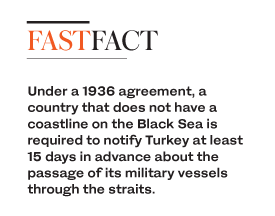ANKARA: The US military has requested the State Department to notify Ankara of its potential plan to sail a warship in the Black Sea’s waters through the Bosphorus Strait, CNN reported on Wednesday.
The US demand is based on the Montreux Convention and it comes amid rising tensions in the region after the seizure of Ukrainian ships around the Kerch Strait, which connects the Sea of Azov to the Black Sea, and the detention of 24 sailors by Moscow.
Although it has not announced its official stance on this looming confrontation, Ankara’s reaction following its diplomatic correspondence with Washington will, therefore, be of critical importance.
The Turkish Ministry of Foreign Affairs provided Arab News with a detailed official reaction on the issue.
“Turkey has been implementing the Montreux Convention for more than 82 years with absolute impartiality and meticulousness. Within this context, the passage of military ships belonging to non-littoral states, as well as those belonging to littoral states from the Turkish straits, takes place according to the principles and rules that are in the convention,” the statement said.
Russia’s latest actions allegedly provoked US President Donald Trump to cancel his planned meeting with his Russian counterpart, Vladimir Putin, during the G20 summit in Argentina.
Under the 1936 agreement, a country that does not have a coastline on the Black Sea is required to notify Turkey at least 15 days in advance about the passage of its military vessels through the straits connecting the Mediterranean to the Black Sea.
Accordingly, a US ship can only remain in the Black Sea for 21 days. The US last had a ship in the region in October.
The Black Sea falls under the activity area of the US European Command (EUCOM).
Meanwhile, reminiscent of Cold War-type tensions between the two powers, an American destroyer recently sailed off the Russian coast, near the Pacific Fleet base in Vladivostok.
Amanda Paul, a senior policy analyst at the European Policy Centre in Brussels, thinks that there is a need for a greater NATO presence in the Black Sea and particularly from the US, which has reduced the number of days of presence there in recent times.
“Sending a US warship to the Black Sea sends a much-needed message to the Russians. The international community must not allow Russia to turn the Sea of Azov into a Russian lake or to consolidate its dominance over the Black Sea,” Paul told Ara News.
“This is very dangerous, not just for Ukraine, but also for Black Sea security more broadly including the littoral states,” she added.
Experts also underline that Ankara tries to balance regional actors and remains cautious, calling on relevant parties to respect international law and maintain regional stability.
“Turkey is the gatekeeper of the Black Sea and completely abides by the rules set out by the Montreux Convention. We saw this in 2008 following the Georgia-Russia war when Ankara refused to allow a US ship access to the Black Sea,” Paul said.
According to Paul, if the US meets the specific conditions for non-Black Sea countries which wish to enter, then there should be no issues with the vessel not being allowed into the Black Sea.
The confrontation between the US and Russia is not restricted to the Black Sea. The Trump administration recently gave Kremlin 60 days to comply with Intermediate-Range Nuclear Forces (INF) treaty in effect between US and Russia since 1987, or the US will withdraw from it — a potential move to trigger an arms race.
Madalina Sisu Vicari, managing director of Vocal Europe, a not-for-profit organization in Brussels, said the purpose of a potential navy deployment would likely be deterrence and defense posturing, not incursion.
“It is also likely that Russia will continue to exhibit assertive behavior aimed at seeking and enhancing its strategic objective of great power status and the establishment of zones of privileged influence,” she told Arab News.
Vicari, who does not see any reason for Turkey to refuse the permission to the US ships, underlined that a confrontation could occur in the situation in which, for instance, US ship(s) would attempt to pass through the Kerch Strait.
“Such a situation would be taken by Moscow as an incursion, and could lead to a military incident. But so far nothing shows that US is seeking this,” she said.
Meanwhile, the US Armed Forces have plans to set up a forward deployment base in Cyprus, and Washington is discussing with Greek Cypriots ways to increase their military cooperation — a move that can further complicate US-Turkey relations.




